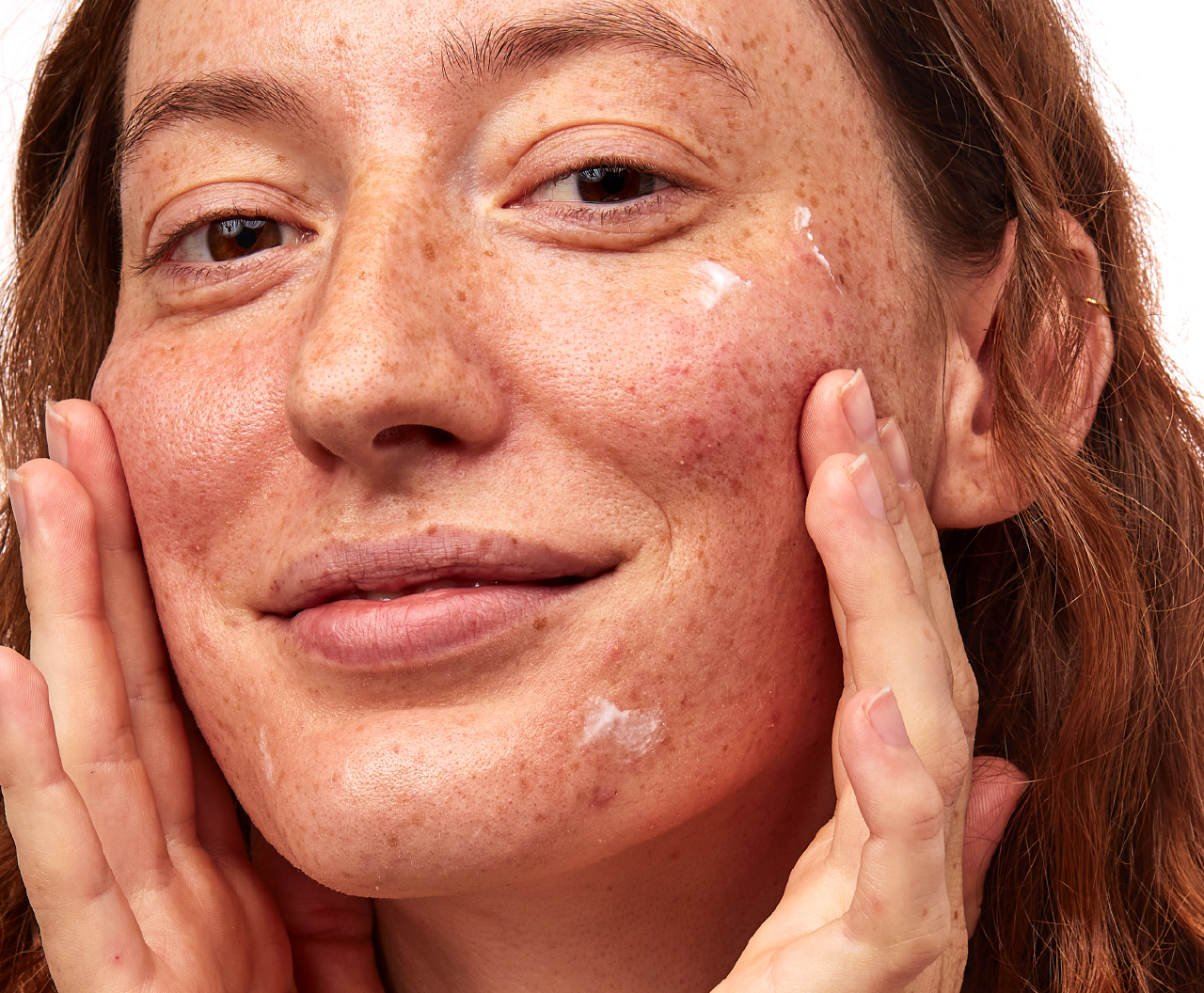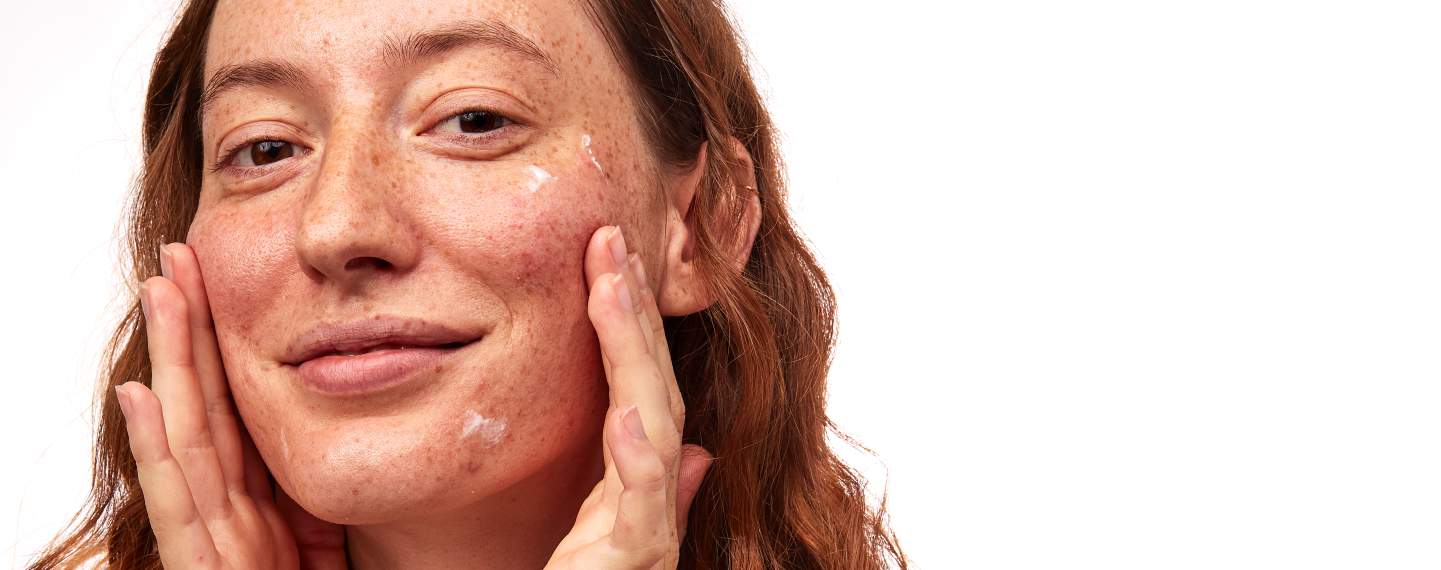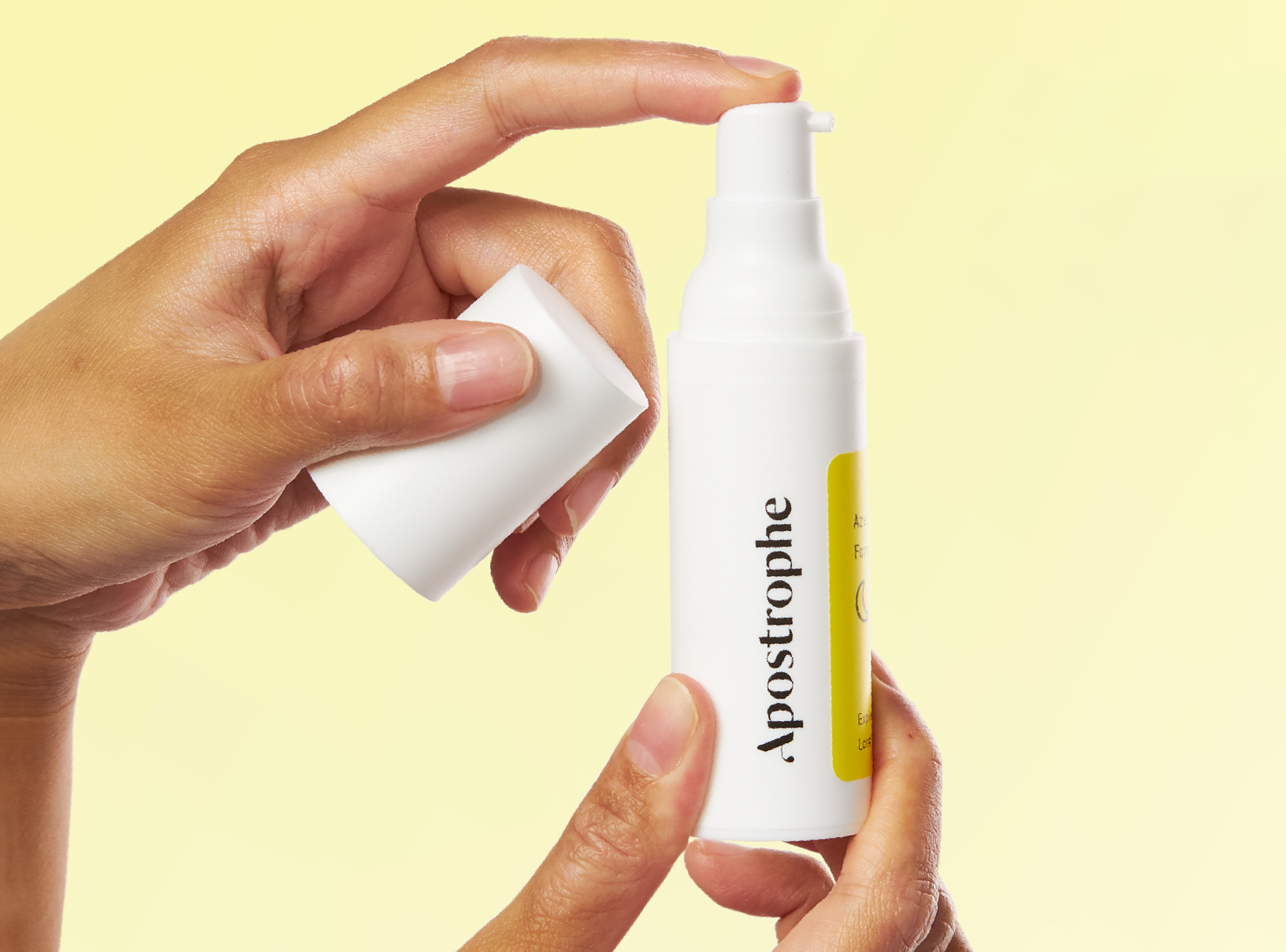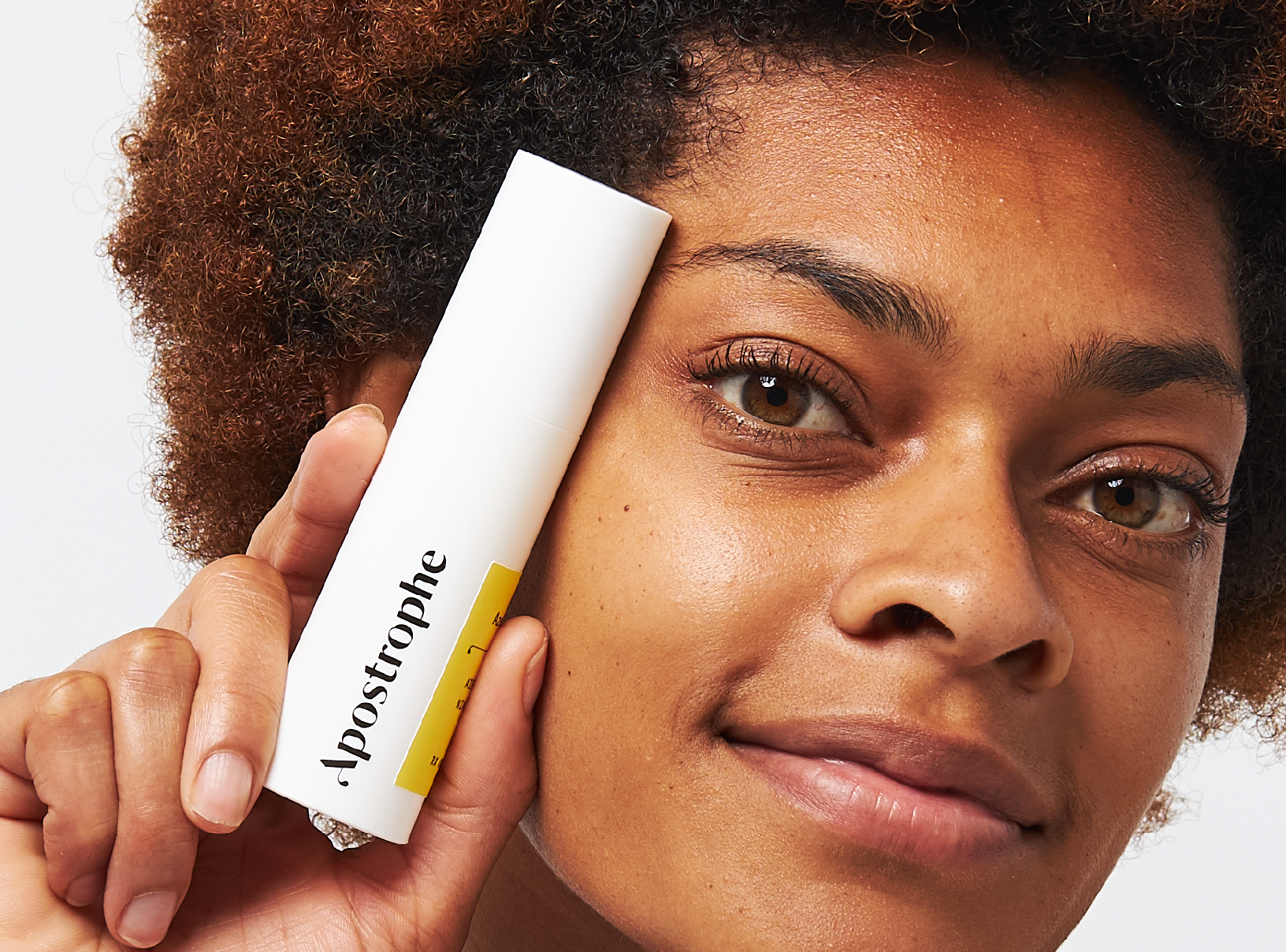Education
Anti-Aging Skincare Routines You Should Try


SHARE
Education
Anti-Aging Skincare Routines You Should Try
Medically reviewed by Kristin Hall, FNP
Written by Apostrophe Team
Last updated 10/1/2024
Getting older has its perks, from the wisdom of experience to — for most people — a significantly healthier bank account. However, it also has a few downsides, particularly when it comes to the way your skin looks and feels.
While we usually associate aging with wrinkles, age spots, and other skin imperfections, the right combination of science-backed products and good habits can go a long way toward limiting the effects of aging on your skin.
Unfortunately, finding the right skincare products can be tough. Like many other fields related to your health and appearance, the world of anti-aging skin care is full of misleading ads and tricky messaging designed to guide you toward products that aren’t always effective.
Below, we’ve cut through all of this to look at the science behind common anti-aging skin care products, medications, and treatments. The goal is simple: to help you find anti-aging skin care treatments and routines that are backed by real science, not just empty promises.
Our list covers everything from over-the-counter products and medications to lifestyle changes and routines that you can implement to protect your skin as you age. We’ve also listed a few of our expert tips to help you avoid products that may not be totally effective.
Skin Aging 101: How Your Skin Ages
Ready to start? Before we get into the best products and habits for protecting your skin as you age, it’s important to cover the basics of how your skin ages in the first place.
Although you might notice wrinkles, age spots, sagging, and other signs of aging suddenly, the reality is that most signs of aging in your skin develop over the course of several years.
This is because your skin is constantly working to keep itself healthy and capable of performing its numerous functions. These include protecting you from the environment, controlling fluids in your body, and regulating your body’s internal temperature.
To keep itself in good condition, your skin renews itself through a process known as epidermal turnover. Every 40 to 56 days, a new layer of the skin rises from the basal layer of your epidermis (the outermost layer of your skin), replacing the old skin that was previously there.
Although the number of cell layers in your skin stays the same as you get older, your epidermis gets thinner over time. Other changes also happen as part of this process:
The number of melanocytes (cells that produce pigment) declines. As a result, your skin may start to look paler and more translucent.
The layer of fat beneath your skin also starts to thin, giving your skin less padding and insulation.
Your skin’s strength and elasticity change. This is what causes the leathery, worn look that’s common in older skin.
The blood vessels in your skin gradually become more fragile, making your skin more prone to bruising, bleeding, benign tumors, and other signs of aging.
Your sebaceous glands start to produce less oil, increasing your risk of itching and dry skin.
Age spots and other pigmented areas develop.
All of these changes have a noticeable effect on the way you look. Wrinkles, fine lines, and age spots become more visible. Because your skin is weaker and less elastic, sagging is more of a problem than it was decades ago.
Several factors play a role in this process. The first is your genetic makeup. Because you can’t choose your genes, there’s no way for you to control or slow down this aspect of the skin aging process.
Put simply, your skin will age as you get older, even if you do everything right. Since part of the process is genetic, it’s important to accept that you can’t control aging completely.
The second factor, which is actually bigger than the first (sun exposure), is your lifestyle. Simple things like the amount of time you spend in the sun, the foods you eat, the skin care products you use, and the habits you develop have a huge impact on your skin as you get older.
This part of this process you can control. Below, we’ve explained how, covering everything from proven, science-based skin care products and medications to basic habits and lifestyle changes that you can implement to limit the effects of aging on your skin.
The Best Anti-Aging Skin Care Products & Routines
With so many options available, working out which anti-aging skin care products to use can be a difficult process. Luckily, a few products can go a long way toward keeping your skin as healthy as possible as you age.
We’ve listed science-backed anti-aging skin care options below, along with additional information on how each treatment works and why it’s worth using.
Skin Care Products and Medications
There’s no need to stock your medicine cabinet with countless products to prevent wrinkles and other signs of aging. Instead, it’s almost always better to stick with the basics. Try these proven, science-based anti-aging products and medications:
Moisturizer. Moisturizer is one of the most effective anti-aging products you can use. In fact, many expensive anti-aging products are largely just moisturizers with a selection of other ingredients mixed in. Moisturizers work by locking moisture into your skin. They help to minimize the look of fine lines, which often precede wrinkles, from developing on your face. You can find moisturizers online and in drugstores.
Sunscreen. Sun exposure is the single greatest factor that causes changes in your skin over time — a topic we’ve discussed in more detail further down the page. Put simply, if you want to avoid visible aging, it’s important to protect yourself in sunny weather. Using a good quality sunscreen is one of the most effective ways to prevent damage to your skin and limit the effects of aging. Make sure to use a broad spectrum, SPF 30+ sunscreen whenever you spend time outdoors, especially on sunny days.
Tretinoin. Tretinoin is a topical retinoid. It works by speeding up your body’s epidermal turnover process, meaning your skin will replace old cells with new ones at a faster pace than it normally does. Research shows that tretinoin, when used over the long term, has a noticeable impact on skin aging. For example, in one study from the 1990s, researchers saw “significant improvements” in fine wrinkling, creases and other signs of aging with tretinoin use. Our full guide to tretinoin and anti-aging goes into more detail on the scientific research behind tretinoin as a skin care treatment, as well as how you can use it to limit wrinkles and other signs of aging.
![]()
PRESCRIPTION TRETINOIN
Target acne, dark spots, and signs of aging with this science-backed ingredient.
Hydroquinone. Hydroquinone is a topical skin-bleaching agent. While it doesn’t get rid of wrinkles, it’s widely considered the best treatment for age spots and other discolored areas of skin.
Lifestyle Changes and Habits
Since so much of skin aging is environmental, making small changes to your habits and lifestyle can often have a significant impact on the health and appearance of your skin. Try to:
Limit your sun exposure. As we mentioned above, the sun can be incredibly damaging to your skin. This is because the UV rays released from the sun can damage your skin at a cellular level, causing things like wrinkles, liver spots and a leathery texture. Avoid UV radiation by limiting the amount of time you spend in the sun. If you want a tan, consider using self-tanner instead of tanning in the sun or using a tanning bed. While it may not look quite as natural, it’ll help you to avoid extra UV exposure and damage.
Wear protective clothing on sunny days. When you’re in the sun, protect your skin by wearing a hat, long-sleeved shirt and other protective clothing. Apply sunscreen to any exposed skin to keep it safe and reduce UV damage as much as possible. Wear sunglasses to keep your eyes and the skin around them safer and more protected from UV radiation that can lead to crow’s feet.
Avoid squinting and repetitive expressions. Making the same facial expressions over and over contracts the underlying muscles. Over time, this can cause fine lines to form in certain areas of your face. Try to avoid making repetitive facial expressions. When you’re outside, wear sunglasses so that you don’t need to squint.
Limit your alcohol consumption. Alcohol can cause your skin to become dehydrated, a factor that can cause wrinkles and other signs of aging over time. Make sure to limit your alcohol consumption and avoid drinking excessively.
If you smoke, quit. Smoking has numerous negative effects on your health, including on the health of your skin. In fact, studies have shown that people who smoke tend to have more advanced facial wrinkling than non-smokers of the same age.
Other things, such as keeping yourself hydrated, getting enough sleep, and exercising regularly, can all help you to keep your skin healthy and wrinkle-free. We’ve provided more details about these in our full guide to anti-aging skin care.
How to Choose Anti-Aging Skin Care Products
When it comes to avoiding wrinkles and other visible signs of aging, not all products are equally effective. Try the following tips and techniques to get the best results from the products you use and avoid treatments that don’t live up to the hype:
Look for proven, science-backed ingredients. Ingredients like tretinoin and others are supported by a large amount of thorough, high-quality scientific research, making them reliable choices for preventing wrinkles and other signs of aging. If you’re comparing anti-aging skin care products, stick to ones that use science-backed, reliable ingredients.
Try not to be fooled by flashy, elegant packaging. Department stores are full of skincare and anti-aging products that come in beautiful packaging, often with a price tag to match. While good packaging is important, remember that it’s the product itself that matters the most. Check the ingredients list before you purchase anything and try to avoid products that focus more on appearance than substance. Choose the right products for your specific needs. Aging can have several effects on your skin, from fine lines to wrinkles and age spots. Pick the best products for the signs of aging you're looking to address, not just general products marketed as good for preventing aging. Be patient. When it comes to anti-aging, results aren’t immediate. Use your products and medications for several weeks before you assess your results. If you aren’t satisfied, talk to your healthcare provider before making changes.
Note side effects. If you experience any side effects while using anti-aging products, speak to your healthcare provider immediately.
Be consistent. Products like moisturizers and medications like tretinoin work best when they’re used daily. Be consistent and stick to your anti-aging routine even after you start to notice results.
In Conclusion
While some factors that contribute to aging are outside your control, maintaining healthy habits and using proven, science-based anti-aging skin care products can help you to avoid fine lines, wrinkles, and other visible signs of aging as you get older.
As the old saying goes, “an ounce of prevention is worth a pound of cure.” The earlier you start to take preventative action against aging, the more effective you’ll likely be at stopping wrinkles and other common age-related skin issues.
Shop this post

Tretinoin
Like what you just read? Sign up for our email list to get the scoop on skincare science delivered straight to your inbox.

Deep Dives
A dermatologist shares his thoughts on the recent studies about benzoyl peroxide and benzene.
Read More
Education
What is milia?
What is milia? Today, we’re jumping into one type of bump that you may have heard about most commonly in infants — milia.
Read More
Education
Best moisturizer for acne-prone skin
If you have combination acne-prone skin, figuring out which moisturizer is best for your skin might be tough. In this guide, we break down the best moisturizer for combination, acne-prone skin.
Read More

